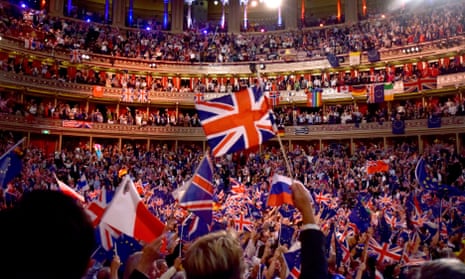The traditional flag-waving anthems Rule Britannia and Land of Hope of Glory could be dropped from the Last Night of the Proms because of their perceived links with colonialism and slavery.
The BBC is reportedly considering whether to axe the patriotic staples in the wake of the Black Lives Matter protests, and the Covid restrictions are seen as an opportunity to make the change.
Reduced orchestra sizes, social distancing and no audiences make the 2020 Proms a very different experience from past years.
The final concert will be conducted by Dalia Stasevska, 35, from Finland, only the second female conductor to preside over the Last Night of the Proms.
“Dalia is a big supporter of Black Lives Matter and thinks a ceremony without an audience is the perfect moment to bring change,” a BBC source told the Sunday Times.
In 2001, four days after the 9/11 attacks, the BBC replaced the songs with more “reflective music” during the Last Night of the Proms, but it returned to the traditional formula in following years.
Chi-chi Nwanoku, the founder of Chineke!, an orchestra whose musicians are majority black, Asian and ethnically diverse, said she could not understand why the BBC had thought it was a good idea to reinstate songs that many found offensive.
She recently emailed BBC Proms chiefs urging them to drop Rule Britannia. “The lyrics are just so offensive, talking about the ‘haughty tyrants’ – people that we are invading on their land and calling them haughty tyrants – and Britons shall never be slaves, which implies that it’s OK for others to be slaves but not us,” Nwanoku told the Guardian. “It’s so irrelevant to today’s society. It’s been irrelevant for generations, and we seem to keep perpetuating it.”
Nwanoku, a principal bass player in London orchestras for 35 years, founded Chineke! in 2015 to provide career opportunities to established and up-and-coming black, Asian and ethnically diverse classical musicians in the UK and Europe. The orchestra made its highly acclaimed Proms debut in 2017.
She said if the BBC did not axe Rule Britannia, she would be mortified. “I will feel invisible with my people and our history. If the BBC are talking about Black Lives Matter and their support for the movement, how could you possibly have Rule Britannia as the last concert – in any concert?”
Plans are yet to be finalised for the concert on 12 September. The BBC said in a statement: “We are still finalising arrangements for the Last Night of the Proms so that we are able to respond to the latest advice in regards to Covid-19 and deliver the best offering possible for audiences.
“We have announced that conductor Dalia Stasevska, soprano Golda Schultz and the BBC Symphony Orchestra will perform at the Last Night of the Proms this year.”
Rule Britannia and Land of Hope of Glory were among the “crudely jingoistic texts” singled out for criticism by the classical music critic Richard Morrison in a column for BBC Music Magazine last month. He wrote that given the restrictions necessitated by the pandemic, “there will never be a better moment to drop that toe-curling, embarrassing, anachronistic farrago of nationalistic songs that concludes the Last Night of the Proms.”
He added: “In the wake of the Black Lives Matter protests and the toppling of the statue of the slave trader Edward Colston in Bristol, it would surely be insensitive, bordering on the incendiary, to roar out these hypocritical 18th-century words, with or without irony.”
Morrison’s column led to a backlash, with the Conservative MP Philip Davies dismissing it as “extremist, virtue-signalling views”. News that the future of the anthems was now under debate was criticised as unpatriotic by several prominent pro-Brexit campaigners, including Nigel Farage.
The Proms presenter Josie d’Arby told the Times: “This year everyone is thinking about racial equality. The Proms has always done that but … it is upping it out of respect for the current climate.”
